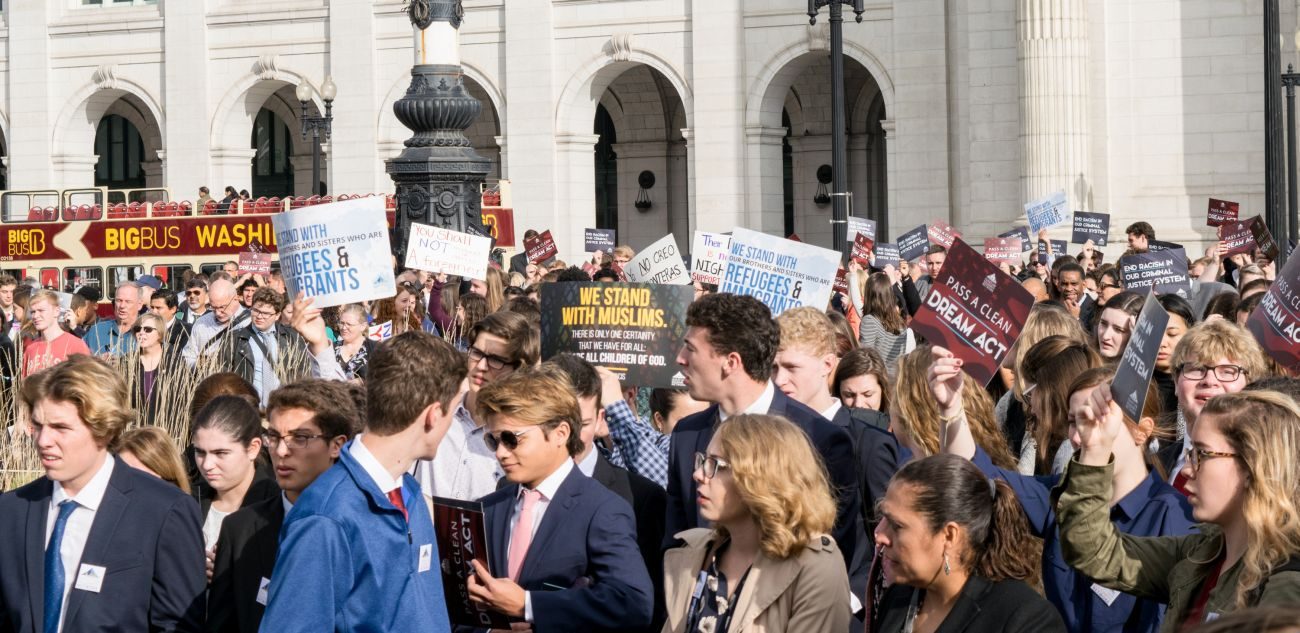WASHINGTON (CNS) — Columbus Circle in front of Union Station in Washington filled with more than 1,400 people holding signs reading, “End mass incarceration,” “Pass a clean Dream Act,” “Immigrants are welcome here,” and “Families have no borders.”
They were there Nov. 6 for a public witness before the start of Advocacy Day, the culmination of the 20th annual Ignatian Family Teach-In for Justice Nov. 4-5 in the Washington suburb of Arlington, Virginia.
Participants headed to Capitol Hill to speak with elected officials to advocate for creating a racially just criminal justice system and for passing comprehensive immigration reform.
[hotblock]
Among their talking points on immigration was urging lawmakers to pass a “clean” DREAM Act — the Development, Relief and Education for Alien Minors Act — to protect the beneficiaries of the Deferred Action for Childhood Arrivals program, or DACA program.
The Ignatian teach-in attracts representatives from more than 120 Jesuit and other Catholic universities, high schools and parishes in the United States, Canada, Mexico and El Salvador.
Christopher Kerr, executive director of the Ignatian Solidarity Network that oversees the conference, said over the years, the goal of the teach-in has been to make it relevant to the realities of what’s happening here and now.
“We were talking about two main issues this weekend: the realities of racism in our society and the impact of immigration policy on marginalized populations,” he told the Arlington Catholic Herald, newspaper of the Diocese of Arlington.
Nearly 2,000 attended the conference, themed “Rowing into the Deep: Magis Meets Justice.”
Participants prayed, sang and listened to speakers, including Jose Cabrera, a senior at Xavier University in Cincinnati, who is undocumented and an immigration reform activist; and Miguel Garcia, a representative from Homeboy Industries, a non-governmental organization in inner-city Los Angeles that provides support to formerly gang-involved and previously incarcerated men and women.
Garcia focused on how to break the cycle of violence. “Why did you profit off of my punishment? Why didn’t you invest in me?” he asked of his time in prison. “Investment instead of incarceration — invest in the people in the community. How much more worth is a human life than mere monetary success?”
Kaitlin Collins Pardo, a teacher at Loyola High School in Los Angeles, was at the conference with several students.
“We came here to learn how to advocate for specific issues,” she said. “I think we have had deep conversations, especially about race, that I don’t think high school (students) get the opportunity to talk about. They get this opportunity to learn about the issues, and take it a step further and be able to advocate on behalf of those issues.”
Virginia Vanegas, a senior at Rockhurst University in Kanas City, Missouri, attended for the second time. “We have so much fire to go and change the world. We have that initiative now,” she said. “I think there’s a lot more work to be done, but the election of 2016 ignited a spark for more people to get involved.”
***
Elliott is a staff writer at the Arlington Catholic Herald, newspaper of the Diocese of Arlington.
PREVIOUS: USCCB unveils new website for National Bible Week
NEXT: Bishops urge Congress to allocate funds for U.N. climate change agency




Share this story